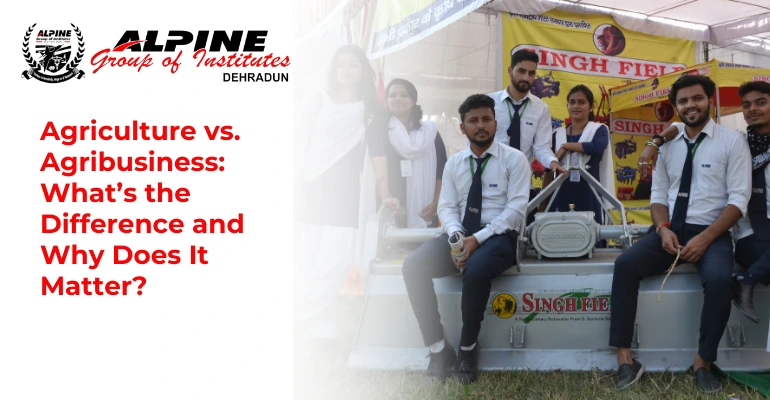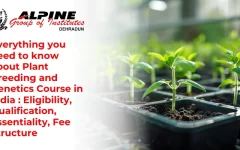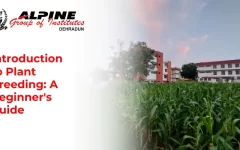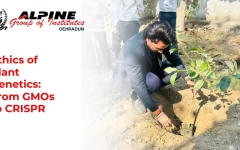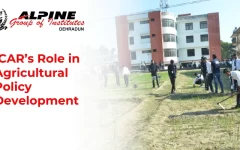Agriculture vs. Agribusiness: What’s the Difference and Why Does It Matter?
2024-12-16 7:56Agriculture vs. Agribusiness: What’s the Difference and Why Does It Matter?
When we think of farming and food production, two terms often come up: agriculture and agribusiness. While they might seem similar, they refer to different aspects of the agricultural world. Understanding the distinction between the two is crucial, especially for students considering careers in the agriculture sector.
What is Agriculture?
At its core, agriculture refers to the practice of cultivating crops, raising animals, and managing natural resources to produce food, fiber, and other products. Agriculture is the foundation of human survival—providing us with the essentials we need, from food to clothing, to fuel.
Agriculture as a practice encompasses:
Crop production:
Growing food, grains, vegetables, fruits, and other plants.
Animal husbandry:
Breeding and raising animals for meat, dairy, eggs, wool, etc.
Horticulture:
The cultivation of fruits, vegetables, and ornamental plants.
Agroforestry:
Integrating trees into farming systems for biodiversity and soil health.
Farmers, ranchers, and agricultural workers are the primary practitioners of agriculture. Their role is hands-on and focused on cultivating and managing land and livestock to ensure food security and a sustainable supply of agricultural products.
What is Agribusiness?
Agribusiness, on the other hand, is the business side of agriculture. While agriculture focuses on the physical process of producing food and other goods, agribusiness is about the economic, financial, and logistical processes that support and manage these activities. Agribusiness professionals handle the complex systems that take agricultural products from the farm to the consumer.
The agribusiness sector includes a wide range of activities:
Supply chains:
Sourcing raw materials, seeds, equipment, and fertilizers.
Processing:
Turning raw agricultural products into food, beverages, textiles, and biofuels.
Distribution:
Managing logistics to get agricultural products from farms to markets, both locally and globally.
Marketing and Sales:
Promoting and selling agricultural products to consumers or other industries.
Finance and Risk Management:
Securing funding for agricultural operations, managing market risks, and ensuring profitability.
Agribusiness covers everything from seed companies to food processing, transportation, and retail. It involves large-scale operations and strategies that require knowledge of economics, supply chain management, marketing, and technology.
Key Differences Between Agriculture and Agribusiness
Focus and Scope
- Agriculture focuses on production: the cultivation of crops, the raising of animals, and the management of natural resources. It’s about the day-to-day work on the farm or ranch.
- Agribusiness focuses on business management: the economic, financial, and operational aspects of getting agricultural products to consumers. It spans the entire supply chain from farm to fork.
Roles and Professionals
- Agricultural professionals (farmers, ranchers, agronomists) focus on the practical application of agricultural techniques, such as planting, harvesting, and animal care.
- Agribusiness professionals (managers, marketers, supply chain specialists, financial analysts) focus on managing the logistics, finances, and marketing involved in agriculture.
Scale of Operations
- Agriculture often operates on a smaller, localized scale, such as family farms or individual crop production.
- Agribusiness typically operates on a larger scale, with multinational companies involved in the processing, distribution, and marketing of agricultural products.
End Goal
- Agriculture’s goal is to produce food and raw materials in a sustainable way.
- Agribusiness’s goal is to make those agricultural products economically viable and profitable for all stakeholders involved in the supply chain.
Why Does This Difference Matter?
Understanding the distinction between agriculture and agribusiness is crucial for students considering careers in the field because it opens up diverse career opportunities. Depending on your interests and skillset, you might choose to work directly in agriculture or take a role in agribusiness.
- If you love hands-on work with crops and animals, agriculture might be a natural fit. Careers like farming, horticulture, animal science, or agricultural engineering require practical skills and a passion for nature.
- If you’re more interested in business, economics, or technology, agribusiness could be the path for you. Professionals in agribusiness manage finances, marketing, logistics, and operations, ensuring that agricultural products are produced efficiently and reach the right markets.
How Can Students Pursue Careers in Agriculture and Agribusiness?
For students interested in either agriculture or agribusiness, there are numerous academic pathways and career opportunities to explore.
Careers in Agriculture
- Degrees: Agricultural Science, Agronomy, Animal Science, Horticulture, Soil Science, etc.
- Skills: Practical knowledge of farming techniques, crop and livestock management, soil fertility, and sustainable farming practices.
- Jobs: Farm Manager, Agronomist, Agricultural Engineer, Veterinarian, Soil Scientist, Crop Consultant.
Careers in Agribusiness
- Degrees: Agribusiness Management, Agricultural Economics, Agricultural Marketing, Food Science, Supply Chain Management.
- Skills: Knowledge of economics, marketing, finance, supply chains, and data analysis.
- Jobs: Agribusiness Manager, Supply Chain Analyst, Marketing Specialist, Financial Analyst, Agricultural Economist, Food Product Developer.
Many universities offer specialized programs in both agriculture and agribusiness, allowing students to choose a focus depending on their interests. Internships, apprenticeships, and hands-on experiences can also provide valuable exposure to the practical side of both fields.
Conclusion: Agriculture and Agribusiness Work Hand-in-Hand
While agriculture and agribusiness may seem like separate fields, they are deeply interconnected. Agriculture produces the raw materials, while agribusiness ensures those materials are processed, marketed, and distributed efficiently. Together, they form the backbone of the global food system.
For students, understanding this difference opens up a range of career possibilities. Whether you’re drawn to working in the fields, innovating in agricultural technology, or managing the business side of food production, there’s a place for you in this dynamic and essential industry. Both fields are critical to feeding the world’s growing population and ensuring that agriculture remains sustainable and profitable for future generations.


